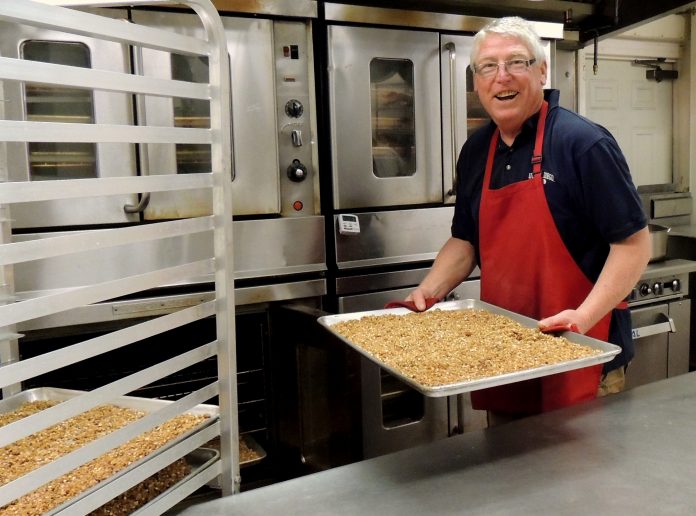Since Curtis Moore started his Safari Crunch granola-making business in 2011, he has seen a lot of changes in the business. He takes in everyone’s concerns for personal health in his granola recipes. But that’s only one reason for the success of Safari Crunch. People go big for the granola’s crunch and taste.
Since Curtis Moore started his Safari Crunch granola-making business in 2011, he has seen a lot of changes in the business. He takes in everyone’s concerns for personal health in his granola recipes. But that’s only one reason for the success of Safari Crunch. People go big for the granola’s crunch and taste.
The aroma is the first thing that a visitor to the kitchen where Moore, a retired CPA, makes the granola. Wonderful scents of cinnamon, nuts, cherries, puffed rice and all sorts of other crunchy goodies waft from the door.
Last week, Moore and his assistant baker Justin Larsen were cooking up Cherry Cheetah. Moore said that it was the second biggest seller after his Nutty Njala.
“It is hard to resist eating everything with the great smells here,” Larsen admitted.
Twombly has worked for Safari Crunch with Moore since he started the business. She had always been a big fan of granola.
“My only issue was that it was too soft. As a chef, I have a thing for texture in food,” she said. “What I like about Curtis’s granolas is how crunchy they are. It’s not like that chewy cardboard-tasting stuff you find in the grocery store.”
The very taste of granola is at the heart of why Moore started Safari Crunch. He always enjoyed granola, but found that more of the commercial granola available in the marketplace had become not only boring in taste but fattening as well.
“They put so much sugar, salt and fat in it. Not good and not necessary,” he said.
Safari Crunch came around after a safari trip to Africa that Moore and his wife took. On that trip, he ate some granola that changed his whole thinking about the cereal.
Knowing one’s product well, including its history, is a recipe for success. Moore discovered that the cereal, initially called ‘granula,’ was invented in the U.S. during the Civil War. Afterwards, the cereal lost consumer favor, but the hippie years of the 60s and 70s revived interest for a while until granola moved once more into the background.
The overall granola market is now approximately $600 million nationally.
Safari Crunch is good enough for a health nut to eat because it is a health food, as Moore sees it, since it has natural grains, nuts, seeds, and dried fruit.
“We focus on reduced sugar and sodium along with the important fact that my Crunch does not contain any preservatives, so it is quite healthy,” he said.
The commercial kitchen that Moore rents in El Cajon has four commercial convention ovens that help keep pace with the baking. About 250 bags of granola are made each week.
Twombly said that she felt proud to work for a local business. “When you work for a smaller company it’s more intimate, they care more about it, it’s a local product, and there’s more pride in what you make,” she said.
Moore said growth is always a challenge for a new start-up. In his first years of the beginning direct to consumers through Farmer’s Markets was Moore’s primary way to sell his granola.
“Sure, we make a great product, but introducing Safari Crunch to consumers, particularly those outside of San Diego is difficult,” he said.
But that is beginning to change, as Moore is placing new focus on three key distribution channels—specialty food retail, snack and restaurant and hotel food service. He continues to employ a great deal of direct-to-consumer marketing like farmers’ markets. He also places his product in retail venues to “demo” Safari Crunch as well as seek opportunities to offer his granola at athletic events such as the San Diego Zoo Half Marathon.
Direct consumers are still the largest buyers, but Moore expects that hotel foodservice will offer the biggest opportunity this year.
“Think about all the times you stay at a hotel that offers a complimentary breakfast. We want Safari Crunch granola to be offered at these breakfasts,” he said.
With more than 1,000 hotels in San Diego County alone, Safari Crunch has a chance to gain a hold. The granola has already been placed in a couple of properties and received some positive testimonials on Trip Advisor.
“This is a fun company,” Twombly said. “I’m proud of it being something local, something small, and hoping it turns bigger. It’s just fun to say that I started with a business from the ground up.”
For more information and to order from the website, go to www.safaricrunch.com.















I’m really enjoying the
I’m really enjoying the design and layout of your website.
It’s a very easy on the eyes which makes it much more enjoyable for me to come
here and visit more often. Did you hire out a
developer to create your theme? Fantastic work! http://passport.pipaw.com/m/user/login?url=http://kreezcraft.com/wiki/index.php/Foods_For_Muscle_Building
Yes! Finally someone writes
Yes! Finally someone writes about reducing diet. https://onelitegarcinia.org/
Incredible points. Great
Incredible points. Great arguments. Keep up the amazing work. https://arizalife.net/
Its like you learn my mind!
Its like you learn my mind! You seem to understand so much about this, like you wrote the e book in it or something.
I think that you just can do with a few % to drive the message house a little bit, but instead of that, this is magnificent blog.
A fantastic read. I’ll definitely be back. http://commdp.serv.usu.edu/wiki/index.php/The_Best_Practice_To_Burn_Fat_Without_Losing_Your_Looks